Last week I lost my oldest friend. I was in my kitchen, drilling a hole in the wall. When I started the hole, Larry was alive. When I finished it, he was gone. At least that’s how I experienced it. While I was taking a break and wiping my brow, I got a text from Allison, his wife, not yet knowing that she was now his widow. She said that Larry was finally at peace.
I suspended my labors. I climbed the hill behind my house and sat, looking out over the river and the city, and wept. A flock of goldfinches came to comfort me, and then departed.
As the soundtrack for this piece, I could select a requiem, but instead, I choose Peter Gabriel’s “Solsbury Hill,” one of Larry’s favorites. Gabriel’s voice even resembles his, which is a comfort to me.
Climbing up on Solsbury Hill
I could see the city light
Wind was blowing, time stood still
Eagle flew out of the night
Larry and I grew up together. We met, I think, in 1982, as we were just banging on the gates of adolescence. In the early days, we would walk in the woods and ride our bikes to the video arcade, but that soon gave way to driving, working, listening to music, and talking about girls and life.
Larry had a hard life. Recently, I realized that I have several friends who have not had it easy in life; the deck seems to be stacked against them, mostly due to very poor parenting. And for some reason, these are the friends I feel the strongest connection with. People who live with pain and sorrow are capable of forging strong bonds, I believe.
He was something to observe
Came in close, I heard a voice
Standing stretching every nerve
I had to listen, I had no choice
Larry’s mother died when he was young, and his father, an unpleasant man of the stern, ex-military type, remarried. Larry’s stepmother, though they lived together for many years, never saw Larry as her own child and was never really kind or loving toward him. Larry also had a stepbrother, an angry boy a couple of years older; essentially a punk, he would sit in his room listening to Black Flag records, while we sat in Larry’s listening to Peter Gabriel and talking about Joseph Campbell and the hero’s quest.
I did not believe the information
Just had to trust imagination
My heart going boom, boom, boom
“Son,” he said, “Grab your things, I’ve come to take you home”
As teenagers, Larry and I both worked at the same pizzeria: I did deliveries, and he cooked. His forearms always had large, wedge-shaped burns on them from the edges of the pizza oven. Though it was tedious work, we had fun. But Larry’s great love was the theater. He was a gifted actor, and his ambition was to go to college to study drama. It was through theater that he met his first girlfriend, Erin. She was a doe-eyed, elfin girl with a sweet smile and a large collection of Beatles records, which I coveted. She was kind enough to make me recordings of all of them when I went off to college, though I remember that she did something quite singular: To save space on the cassettes (ask your parents if you don’t know what those are), she would let the record play to the end of the first side of the tape, fade the current song out as the tape ended, and then fade the song back in on the other side, from roughly the point at which it had faded out. I thus ended up with the entire Beatles discography, but with some super-weird pauses. But forgive me—let’s get back to Larry.
To keep in silence I resigned
My friends would think I was a nut
Turning water into wine
Open doors would soon be shut
Larry also wanted to go to college, but his father wouldn’t pay for him to study theater, which I think he regarded as an embarrassing waste of time. So Larry did something that filled me with dread: He enlisted in the Army, so as to go to college on the G.I. Bill, which had been helping servicemen get an education since World War II. I couldn’t bear the thought of sensitive little Larry, with his Peter Gabriel records and his books on Jungian analysis, being shipped off to Texas to have his head shaved. But off he went, and learned to be a radio technician, which didn’t involve shooting people. I was relieved.
So I went from day to day
Though my life was in a rut
‘Til I thought of what I’d say
Which connection I should cut
I realize now that many of my memories of Larry involve cars. Maybe that’s not surprising for two teenagers in the USA. I remember that I got my license first, and we went for a drive on the first day we had ever seen ice on the road. We were living in Virginia, and I had not been taught how to drive on ice, so I did all of the things that come naturally and are exactly wrong. I still have a vivid visual memory of Larry’s face, eyes wide, mouth open and wailing, with several of the neighboring houses flashing past in the background—various times— for what seemed like half an hour. We eventually hit a mailbox and stopped.
Or there was that time we were trying to find our way to a New Year’s Eve party in a neighborhood we didn’t know. We realized that we were too late—it was 11:59—so we just pulled the car over in a random spot, got out, and looked up at the sky, waiting for the fireworks. I actually think it was that same night that we ended up somehow going to a late-night diner with a young woman we didn’t know—the kind of sulky, skinny blonde with a drawl that seemed to be so plentiful. I remember that we were sitting in the diner, talking about music and about beauty, and said, with her drawl, “I love beautiful music. And you know what the most beautiful music I’ve ever heard is? The Scorpions!” Larry and I laughed about that many times over the subsequent years.
I was feeling part of the scenery
I walked right out of the machinery
My heart going boom, boom, boom
“Hey,” he said, “Grab your things, I’ve come to take you home”
I remember Larry’s laugh. His face would light up, his apple cheeks shining, and he would laugh like a joyful woodpecker, emitting a burst of short “he he he he” sounds. He had a wonderful sense of humor. When he started to go gray early, he told me that he had done a theater outreach with some urban youths, one of whom came up to him and said, “Man, I can’t believe it! You look just like Elvis, except with white hair!” He told me this and laughed, perhaps somewhat ruefully.
I remember one day, sitting in the family room in his house in Massachusetts, when we laughed and laughed at some joke that we kept repeating. I have tried to conjure up that joke, but memory fails me. And that is also what happened to Larry.
When illusion spin her net
I’m never where I want to be
And liberty she pirouettes
When I think that I am free
It was at some point in his forties, when Larry was teaching drama in school, that he started to forget things. As it got worse, he went for testing, and eventually it was discovered that he had early-onset Alzheimer’s. This was devastating. But to make things worse, he had a family: his wife Allison, one of the strongest and most purely good people I have met, and two wonderful children, both of them under ten when this began.
I remember Allison and Larry’s wedding, and for some reason, especially one detail: One of the guests was a middle-aged man in a gray suit and a silk tie with a print of a trout on it. This man had a cell phone, which was still a fairly big deal to some people then. During the ceremony, this phone rang, loudly—and he answered it! “Oh, hello! No, I can’t really talk now. I’m at a wedding.” I’m sorry to say that that’s one of the things I remember most clearly about the day. I hope Allison retains some fonder memories.
Larry was also part of my own wedding. This was a small affair, with fewer than a dozen guests. It was winter, and my Swedish bride and I, quirkily enough, decided that we wanted to get married in the middle of a frozen lake, for reasons of symbolism and just general coolness. The difficulty was finding a justice of the peace who was willing to perform the ceremony out on the lake. But Larry was game, and he stood beside me on the ice.
Watched by empty silhouettes
Who close their eyes but still can see
No one taught them etiquette
I will show another me
This is where the story becomes filled not only with sadness but also with regret. I moved away from the US not long after that wedding, and largely lost touch with Larry. I didn’t see him for several years, until I learned of his diagnosis. Then I went and visited him and his family when I could, but it wasn’t much. I have always been hounded by guilt that I couldn’t, or wouldn’t, do more. I’m not really sure what I could have done, other than to be there for them emotionally. But this is certainly one of the hardest things about moving to another country—the feeling of neglecting those we love.
Larry’s cognitive state and health declined gradually over the course of several years, until last Friday. I cannot imagine the effect this has had on his wife and children. I wish the best for them, and hope that they can find peace and ease of being somehow. I know that Larry has finally found it. Goodbye, my brother. I love you still.
Today I don’t need a replacement
I’ll tell them what the smile on my face meant
My heart going boom, boom, boom
“Hey,” I said, “You can keep my things, they’ve come to take me home”





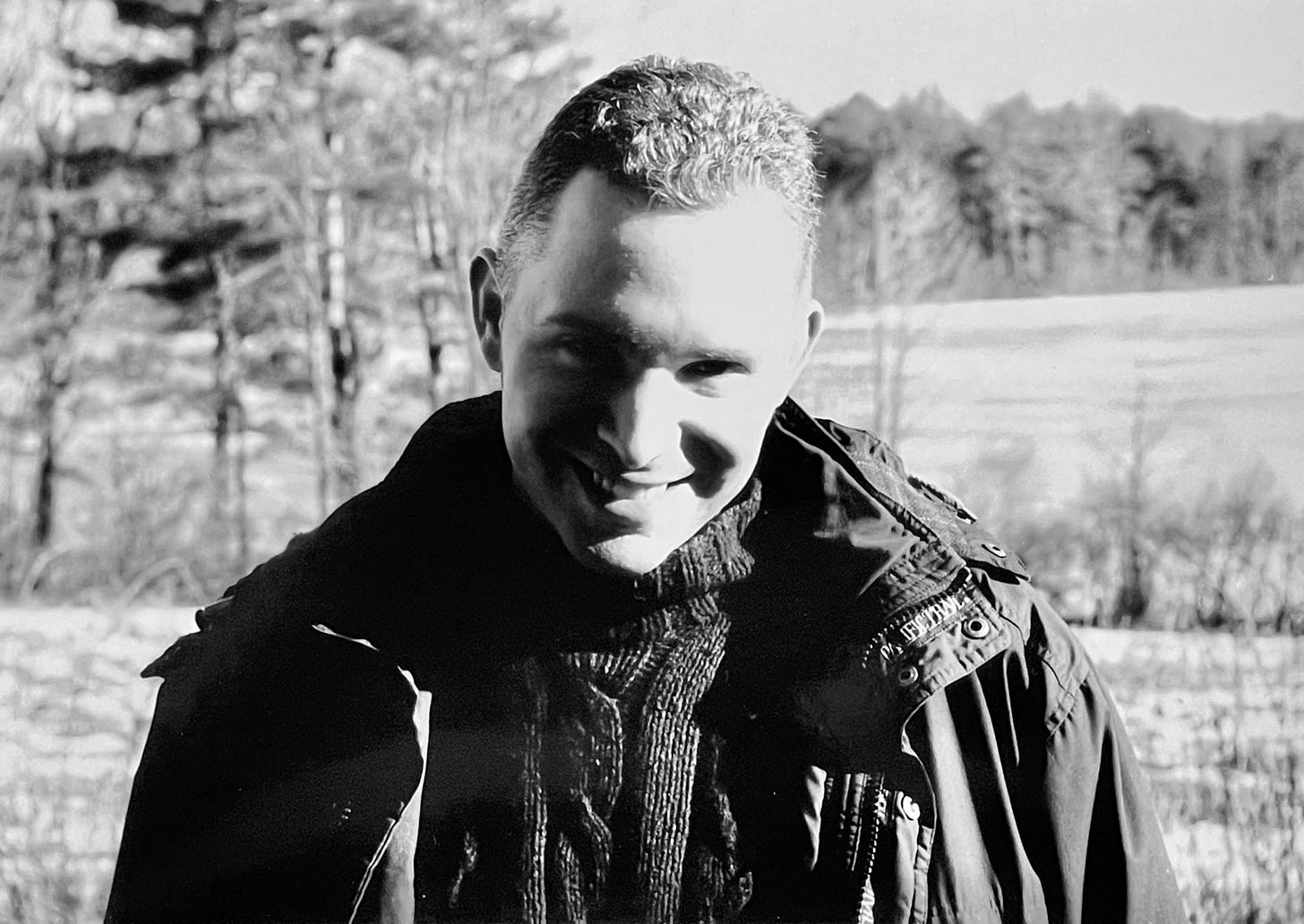

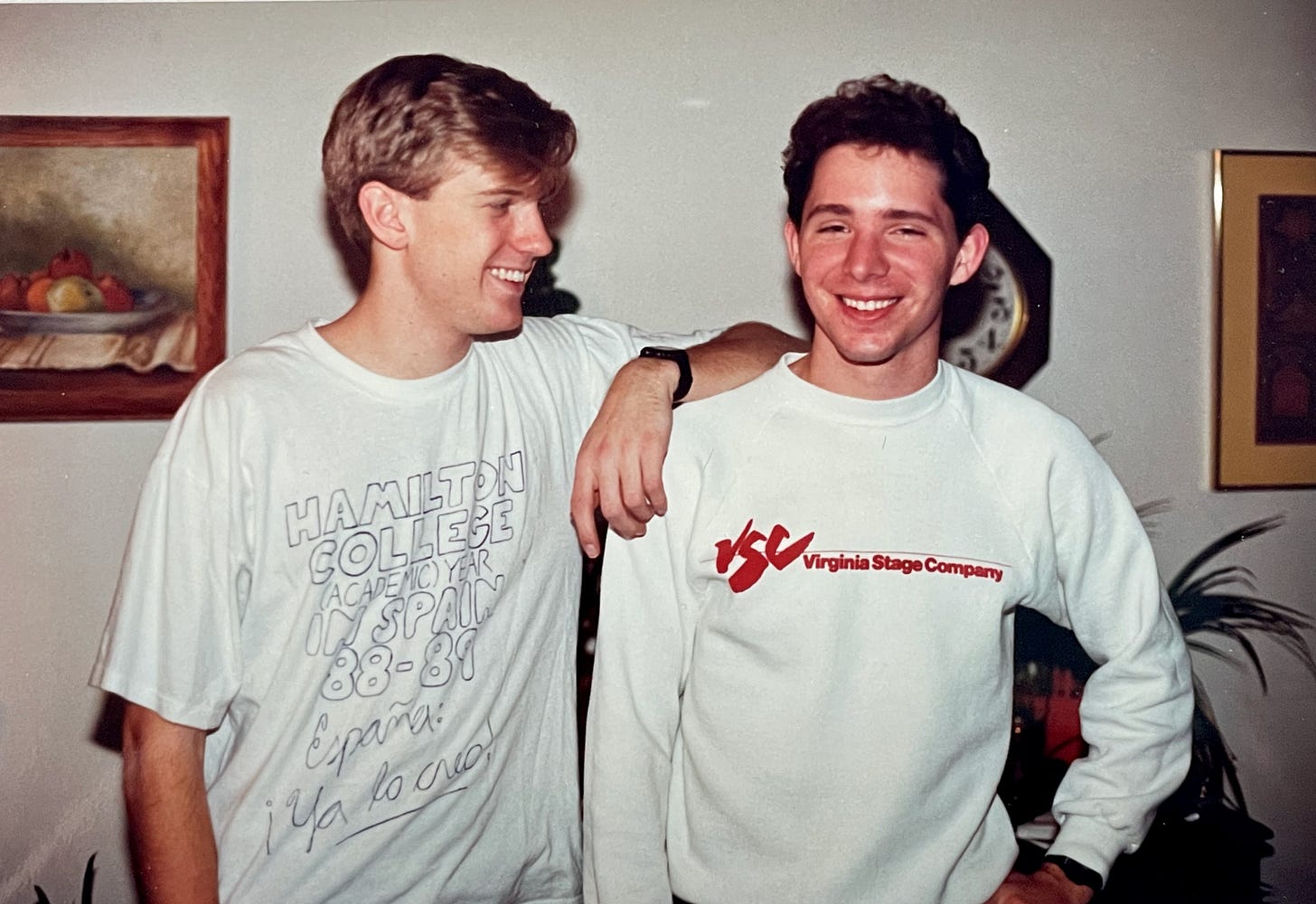
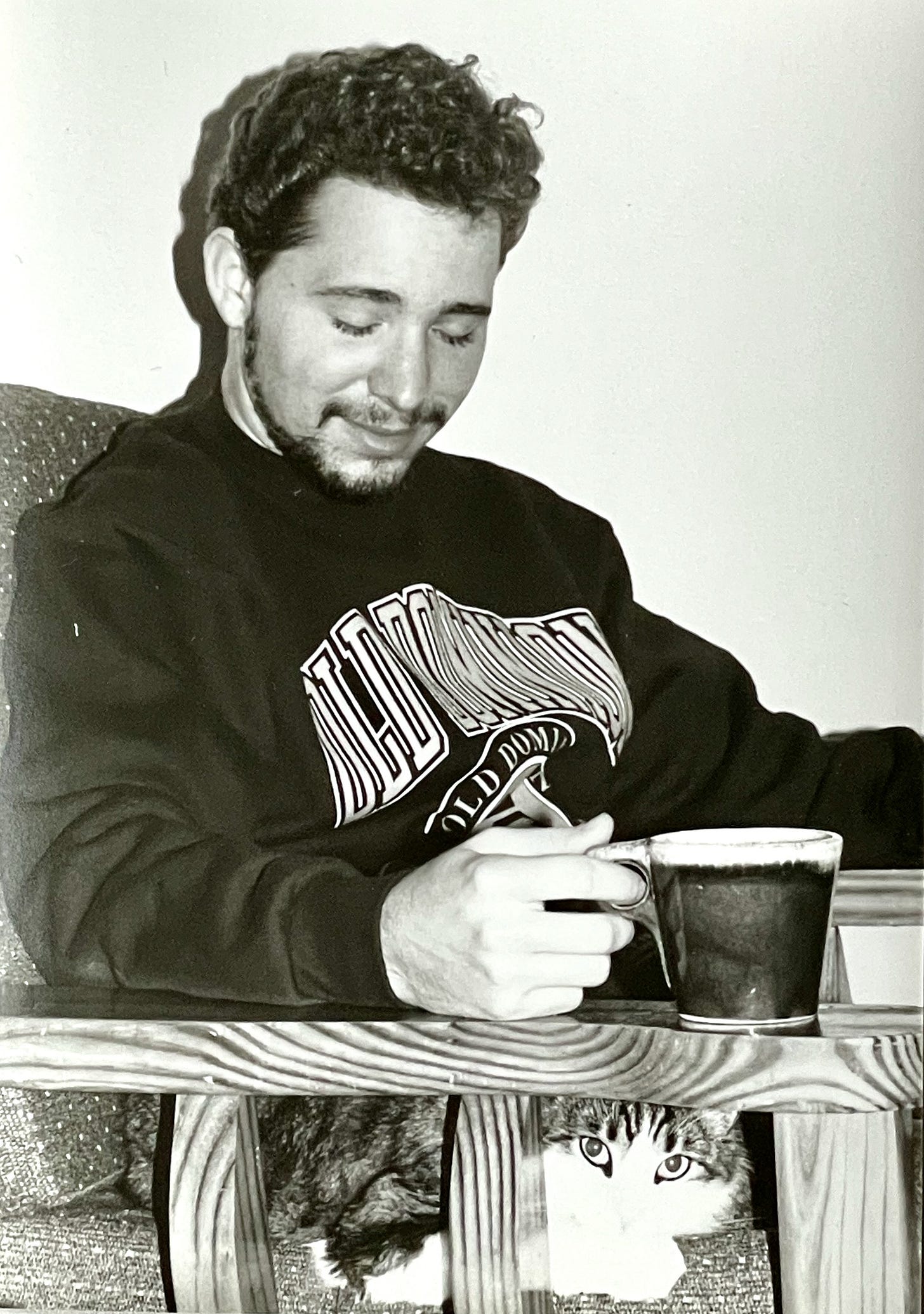
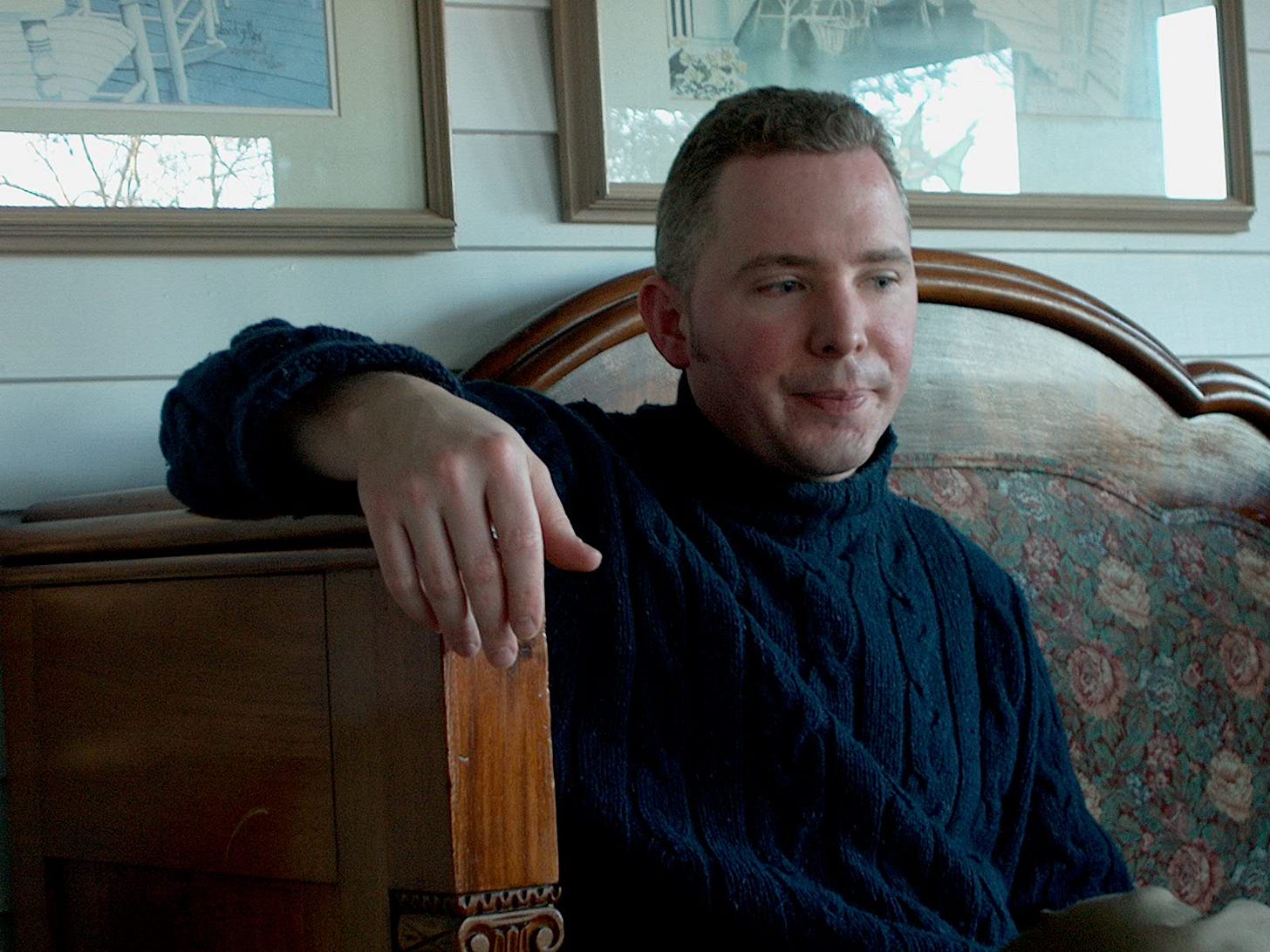
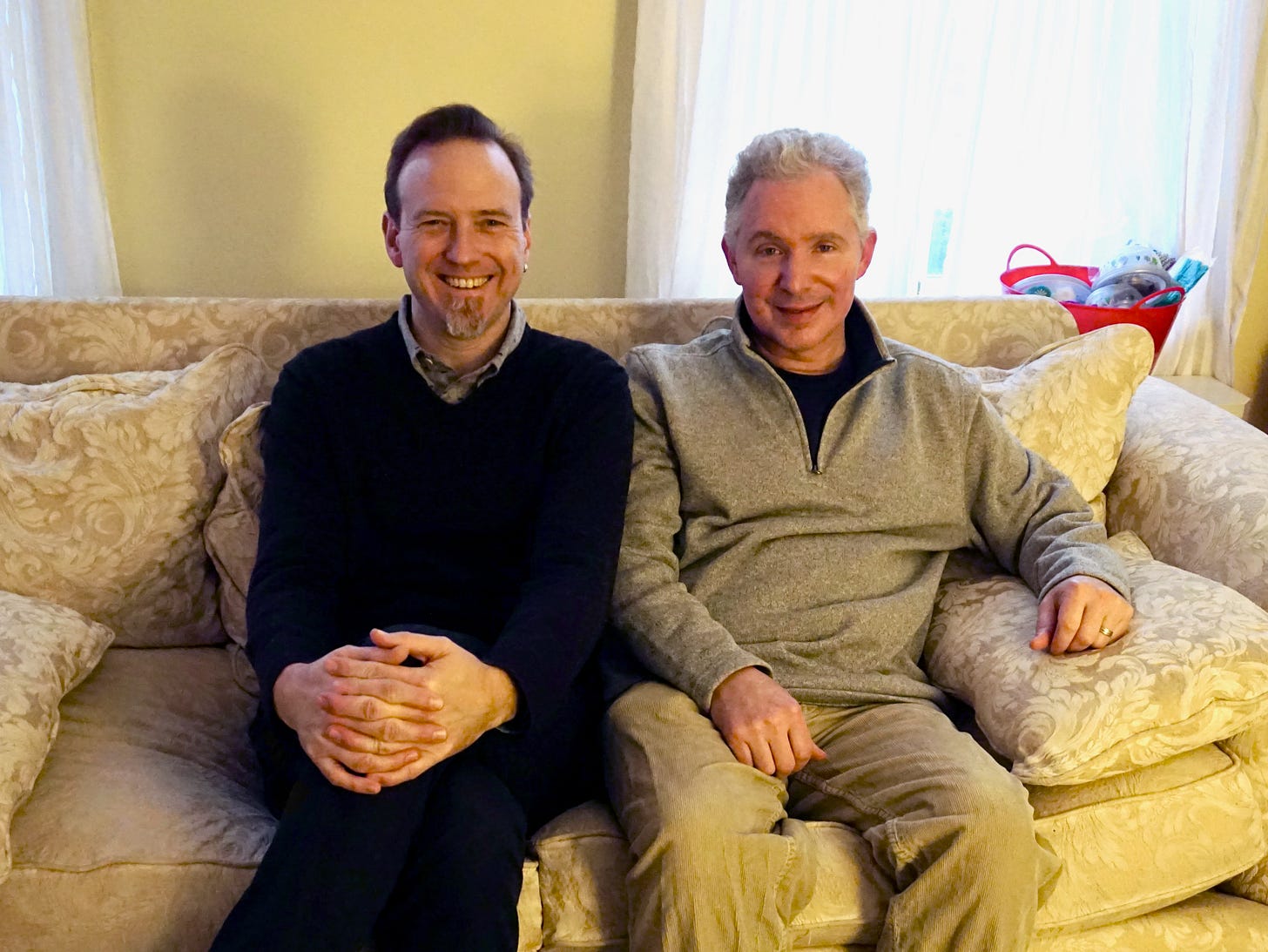
I am deeply sorry for your loss. Your memories of him in this tribute with Gabriel’s Solsbury Hill as connective tissue is deeply touching.
So sorry, Gregory. What a warm tribute to Larry. I hope some catharsis in writing it and thank you for sharing your memories of your friend.
(Just found your writing via Eliza Anderson’s Note.)